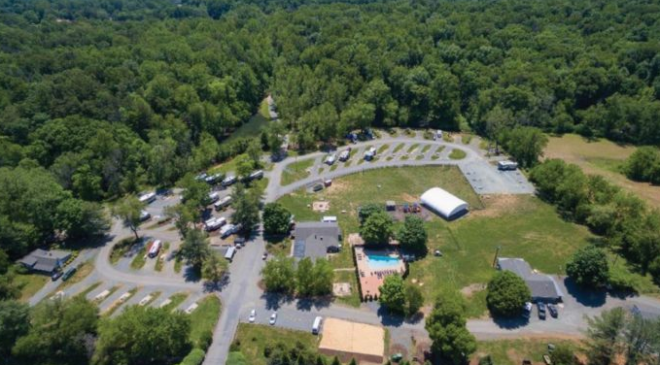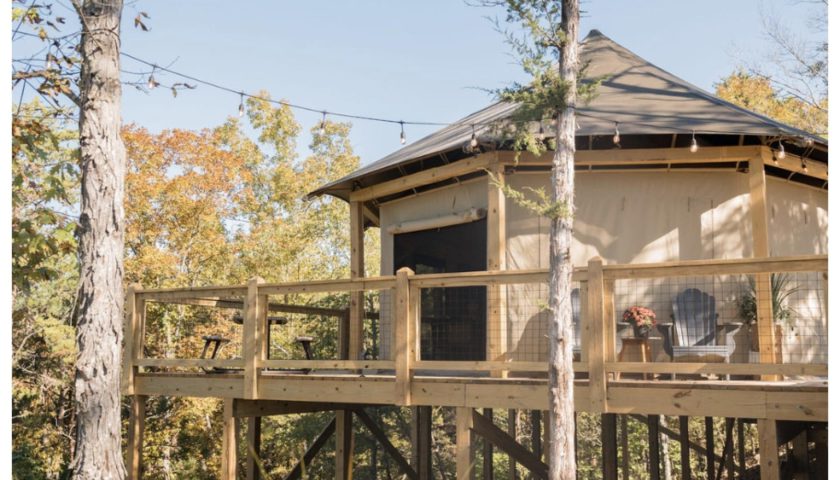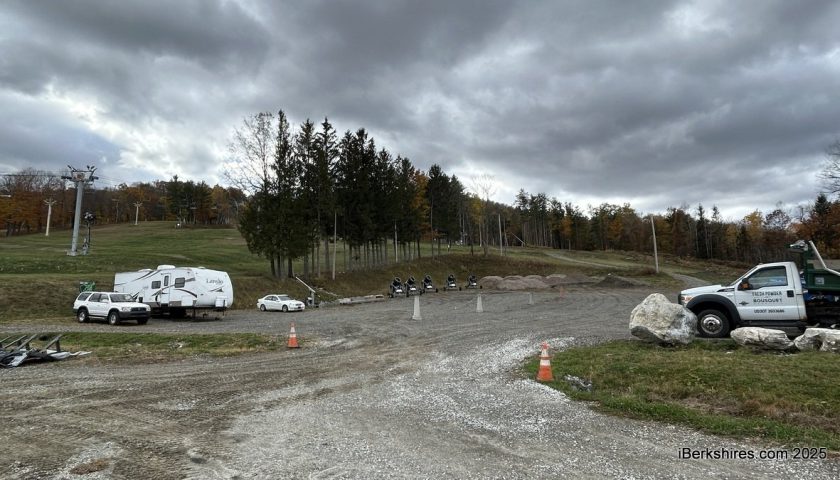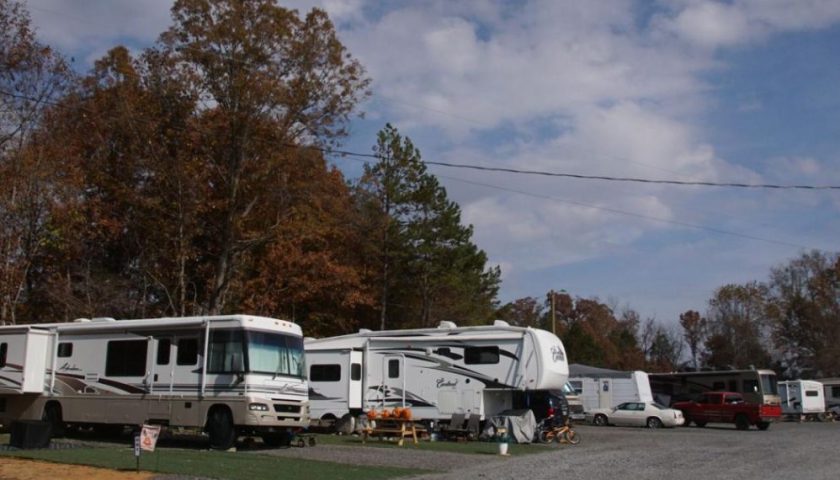The Misty Mountain Camp Resort (MMCR) in Greenwood has asked Albemarle County for a special use permit to allow it to expand its facilities by adding 53 new RV campsites for a total of 179 sites, and to allow its cabins to be leased during the months of November through March, which was disallowed under prior permits. As part of the permit agreement, MMCR would limit the duration for which any rentable cabin is used to 30 nights per stay.
The resort sits on 47 acres off Rt. 250 just west of Greenwood Grocery. It is co-owned by Andrew Baldwin, who also owns Piedmont Place in Crozet and who founded Bundoran Estates in North Garden. The permit application was heard by the county Planning Commission at its January 10 meeting, during which several adjacent neighbors to Misty Mountain spoke in the public comment period about their concerns about the potential expansion.
“My home is directly opposite the array of some 50-odd new campsites in the plan,” said neighbor James Rovnyak. “Functionally, this is an RV parking lot and motel. I strongly object to the characterization of impact on our property as ‘minimal’ [as stated in the project description]. Our privacy is compromised by the plan and I have safety concerns. A transient population will be able to see and hear our comings and goings and when we turn the lights out at night to go to bed. Because of the topography, no screening can mitigate this. I urge rejection of the plan—this is unsuitable for the type of residential area that we have.”
Rovnyak’s wife, Virginia, echoed his concerns. “I’m concerned about safety with that many people over there,” she said. “Our house is highly visible and … it would be very easy for someone in the campground to observe our activities and vandalize, rob, or assault us. My husband and I are in our 80’s and we are easy marks for someone with ill intent. Warning signs are not going to deter such a person. If the county allows this expansion, I ask the county to require a people-proof fence around the entire property.”
Greenwood resident Dan Hunt and his wife share a border with the MMCR property to the east, and Hunt reiterated the issue of campers crossing property lines onto adjacent land. “We have had people on the [campsite] who have wandered onto our property, and that’s what we want to prevent,” said Hunt. The permit application proposes “an 8-foot tall, black, solid-wood screening fence” to be installed along the western corner behind the new campsites, but it didn’t appear to extend far enough north to protect Hunt’s and other neighbors’ parcels.
“I’m not so much worried about the screening as I am the wandering, so a chain link fence in the woods I think would be fine,” said Hunt.

Rovnyak and Hunt also brought up the lack of engagement by MMCR’s owners on these and other concerns that were raised at a community meeting discussing the expansion in March of 2021. “The owner states that he has met with each neighbor one-on-one and describes the resolution [of those prior concerns],” said Rovnyak, “but we heard nothing between March and late December when we received the notice of this meeting.”
“At that March meeting, the county staff assured us that they were not going to show anything to the Planning Commission unless the issues that the adjacent property owners have brought up have been addressed,” said Hunt. “So now, why are they coming to the Planning Commission for their approval? The county planning department made a commitment and they haven’t fulfilled that commitment.”
Everybody goes to the Planning Commission and the Board of Supervisors claiming the best of intentions, but when you get into the enforcement of these permit conditions, that’s when not only do the owners not follow these special use permit conditions, but there’s no enforcement out there.”
Hunt also questioned the seeming imbalance between the amount of county staff attention given to citizens versus developers. “[The staff] spends a lot of time with the permit applicants, yet their hosting of one public meeting is the only involvement that we normal citizens get,” he said. “You know, in theory, the county people are supposed to look out for the citizens of the county, not just look out for the developers, but I’m not sure they have a formal requirement to include our input and to make sure our issues are addressed.”
Hunt says it’s important to nail down any applicant commitments before final approval of the project. “Everybody goes to the Planning Commission and the Board of Supervisors claiming the best of intentions, but when you get into the enforcement of these permit conditions, that’s when not only do the owners not follow these special use permit conditions, but there’s no enforcement out there. The police are not interested and there doesn’t seem to be a [compliance] mechanism through the county.”
At the Planning Commission meeting, Baldwin spoke to assure both the neighbors and the commissioners that he understood their concerns. “We want to do everything in our power to be the best neighbors that we can be,” said Baldwin. “And to whatever extent that takes, we are willing to hear it and listen to it. I think it probably comes as a shock based on previous ownership and some of the stories we’ve heard, and I understand that gaining trust takes time. That said, we’re here, we’re listening, and we’re happy to take anything into consideration. And like I said, we’re not in a rush. We’re really trying to enhance [what we offer] and to be good neighbors.”
The Planning Commission (PC) voted unanimously to recommend that the Board of Supervisors grant the special use permit. It included a list of recommended conditions, such as that no new campsites can be built in the 100-year floodplain and that no campers may reside or camp on the property for more than 180 days in a calendar year. The commission also directed staff to “work with the applicants to determine appropriate locations for screening and security fencing, and to make the new campground layout more compact, to increase visual buffer.”
Several days after the PC meeting, Baldwin met with the Hunts and Rovnyaks on site regarding their concerns, and both sets of homeowners are cautiously optimistic about Baldwin’s commitment to addressing the screening and trespassing issues. The neighbors said that Baldwin agreed to erect a solid wood screening fence along the Rovnyaks’ property and part of the Hunts’, and then to extend the barrier with chain-link fencing along the remainder of the Hunts’ parcel. “I gather from Mr. Baldwin that these things we agreed on will be written down and signed and attached to the special permit,” said James Rovnyak.
“We were pleased about having a fence the whole way, combined screen and chain link,” he said. “And then secondly, we were grateful that Mr. Baldwin extended the screening fence beyond what they had originally planned. Screening fence will help somewhat, but as we’ve indicated, no fence will completely mitigate the problems.” Because the land slopes upward on the Misty Mountain side, even a ten-foot fence will still allow campers and neighbors to see each other. “But this should help significantly with the problem of campers wandering off the property and coming into ours.”
Looking ahead to the Board of Supervisors’ hearing, Virginia Rovnyak also commented on the larger issue of development encroaching into rural areas with no obvious limit. “Mr. Baldwin was very obliging with respect to our concerns of safety and privacy,” she said. “However, the result [of the permit approval] is a growth of the business to the point that there could be over 300 people next door to us on busy weekends, and this will certainly diminish the rural atmosphere out here. This is not a designated growth area and my question for the supervisors will be, why do we have to lose so that someone else gains?”



